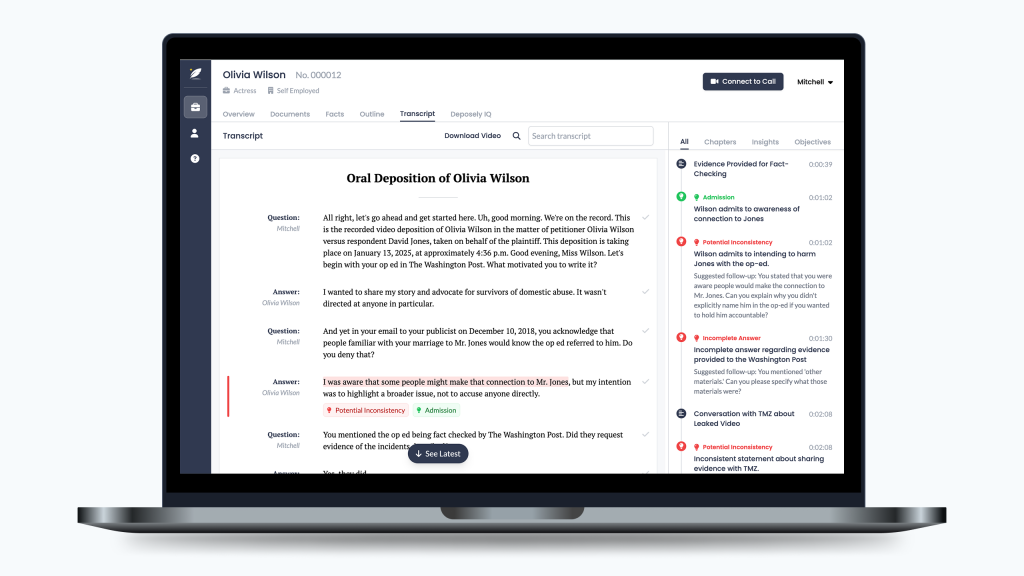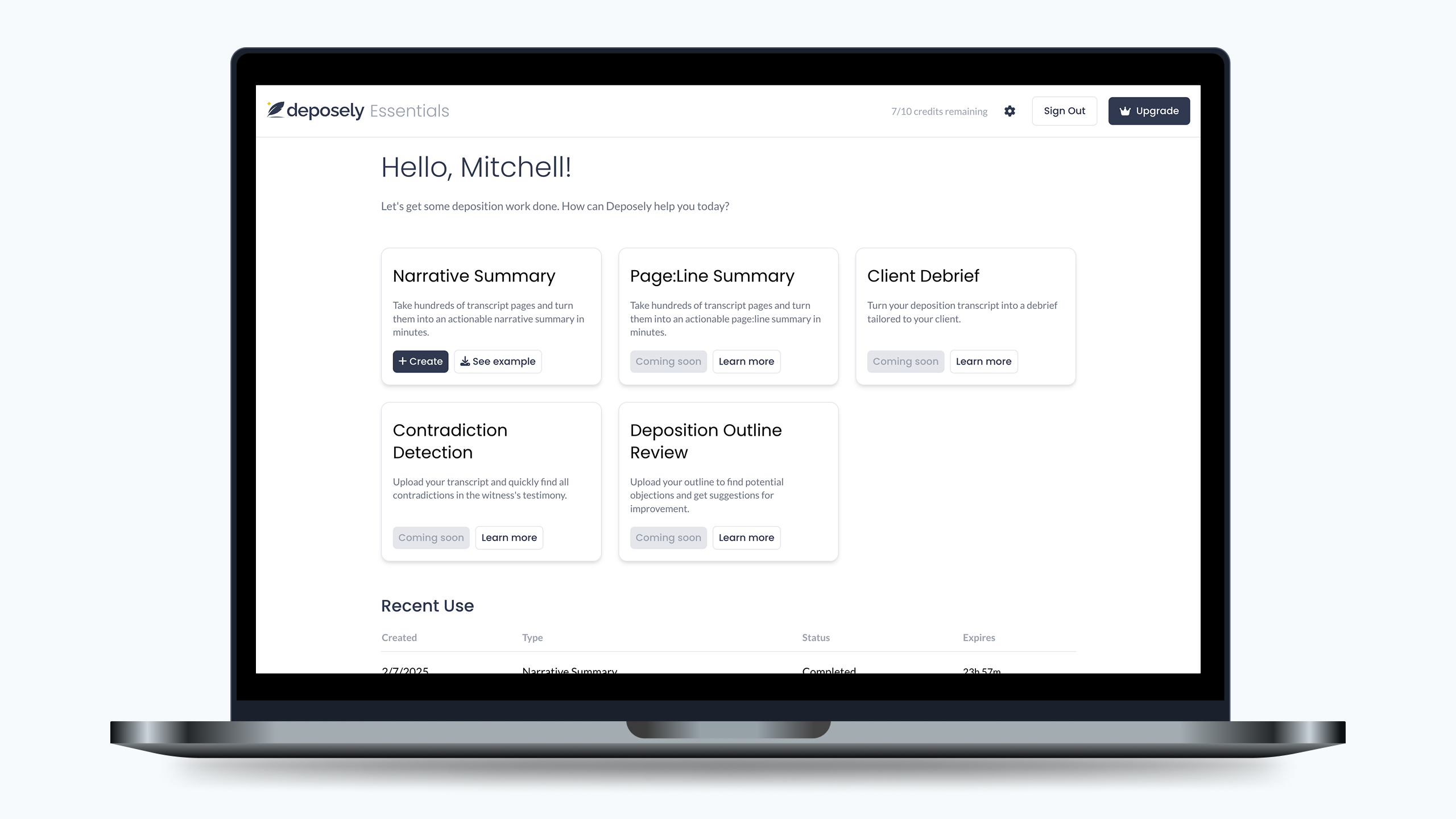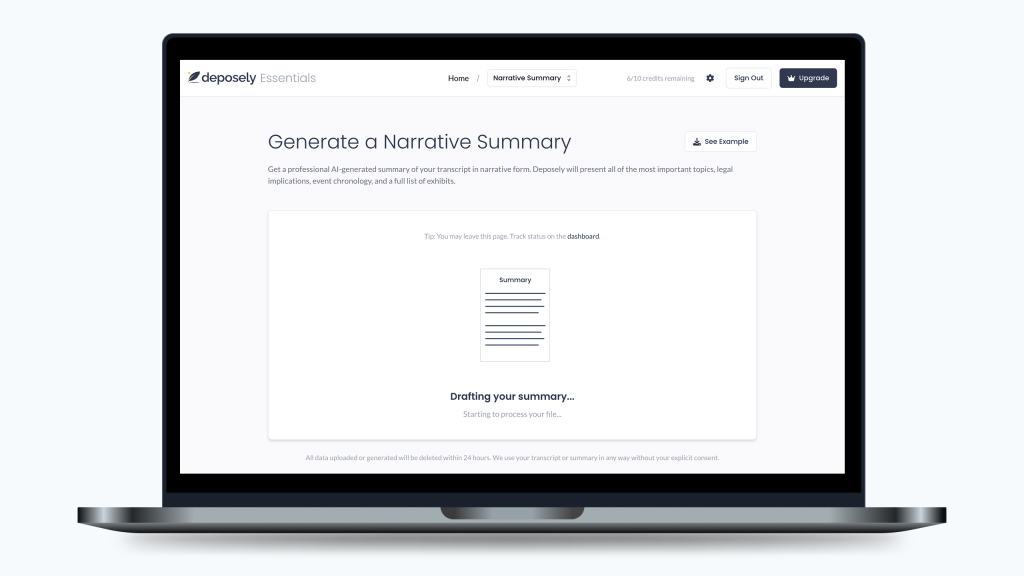Legal technology startup Deposely today announced the launch of Deposely Essentials, a free suite of AI-powered tools for analyzing deposition transcripts, while also previewing its broader platform that provides comprehensive AI assistance for the entire deposition lifecycle.
The Bellevue, Wash., company’s Essentials program will initially offer an AI Narrative Summary Generator that automatically creates concise summaries of deposition transcripts, with plans to add additional free tools in the coming months, including transcript analysis, client debriefs, and contradiction detection capabilities.
The free tools are part of Deposely’s broader mission to increase access to justice by making advanced litigation technology more widely available, particularly to smaller law firms and legal aid organizations, Mitchell Kossoris, the company’s co-founder and CEO, told me during a preview demonstration.
“We believe that by offering powerful AI tools for free, we can help attorneys spend less time on tedious transcript reviews and more time on strategic casework,” said Kossoris. “By reducing the time and cost burden of legal work, we’re enabling more attorneys, especially those in smaller firms and underserved communities, to take on cases they otherwise might not have had the capacity for.”
Flagging Contradictions
Beyond the free Essentials tools, Deposely is developing a comprehensive platform that assists attorneys through the entire deposition process, from preparation through post-deposition analysis. The full platform, currently in beta testing, includes features for automated deposition outline generation, real-time AI analysis during depositions, and tools for reviewing and analyzing transcripts.

Deposely is able to flag inconsistencies in a deponent’s testimony in real time during a deposition.
A key feature of the platform is its ability to flag contradictions between a witness’s testimony and documentary evidence in near real-time during a deposition. The system can also track whether attorneys have accomplished their outlined objectives and automatically note when specific planned questions have been addressed, even when not asked verbatim.
In this sense, Deposely is similar to the Depo CoPilot launched by Filevine last September (which I wrote about here). That product also provides real-time insights into inconsistencies in a deponent’s testimony and helps you monitor whether you are meeting your goals for the deposition. However, Deposely takes that a step further, finding contradictions not only within the deponent’s testimony, but also between the testimony and documentary evidence.
The platform leverages Google’s Gemini AI model, which Kossoris said was chosen for its ability to process up to 2 million words of context — significantly more than competing models. This capability allows the system to analyze large volumes of case documents and identify relevant connections during depositions.
Deposely plans to price its full platform on a hybrid subscription and usage basis, with a baseline subscription covering preparation features and additional charges per hour for live deposition assistance. While exact pricing is still being worked out, Kossoris said the company is targeting approximately $300-350 per deposition for the complete feature set.
Streamlining Depositions
Kossoris is a former software development engineer at Amazon Web Services whose parents were both litigation attorneys. Growing up, he said, he saw first-hand the work and stress that went into preparing for a deposition. “That’s a real problem that can now be solved with generative AI,” he said.
Kossoris said his goal is to make that process as streamline as possible. “In order to set up a deposition, we just require you to upload the court filings, which you will have already done, and then the evidence, which you will have already collected.
“So you just upload those documents and we handle the rest of it. We set up the background, the case summary. We extract all of the claims and defenses and legal elements out of that. We try to streamline the whole process.”
He launched the company last year with friends and family funding and he plans to seek a full seed round later this year. It began selling its platform in January and has already attracted interest from both individual practitioners and mid-sized firms, he said.
Security and data privacy are emphasized across both the free and paid offerings. The company commits to deleting all data uploaded to Essentials tools within 24 hours and emphasizes that no customer data is used for AI training without explicit permission.
The free Essentials program will expand over the coming months to include:
- AI Page:Line Transcript Summaries that link key points to specific transcript locations.
- AI Client Debrief Generator for creating client-friendly deposition summaries.
- AI Outline Review to ensure comprehensive topic coverage.
- AI Contradiction Detection to identify inconsistencies in testimony.
This news comes amid growing interest in AI-powered litigation tools, with several companies recently launching products focused on various aspects of the litigation process. Deposely aims to differentiate itself through its end-to-end approach to the deposition process and its ability to integrate analysis of documentary evidence with real-time deposition assistance, Kossoris said.
The full platform is expected to move from beta to full release in early March, following the Essentials launch. Legal professionals can access the free Essentials tools at www.deposely.com/product/essentials.
 Robert Ambrogi Blog
Robert Ambrogi Blog
